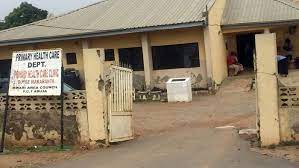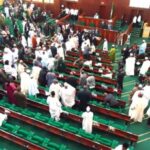By Hassan Zaggi
Nigeria is, indeed a wonder. Despite the excellent policies and programmes of the government aimed at improving the health of the people, Nigeria’s health system is still crawling.
Nigeria’s primary health care system currently, is as good as non-existent in most parts of the country.
In fact, where they pretend to exist, especially, in urban centres, the services are poor and further crippled by lack of the basic equipment and the required man power.
Its painful to recall the initiative introduce by the President Muhammadu Buhari’s administration in 2017 to revitilise 10,000 primary health care centres across the political ward of the country.
Speaking when flagging up the scheme then, President Buhari said the plan, was to make, at least, one PHC fully functional in each of the political wards across the country.
In the first phase of the plan, the government selected a PHC in each of the 109 senatorial districts. State and local governments as well as development partners were expected to complement this effort by also picking some PHCs to revitalise.
The essence of the scheme was to transform the primary health care system and make the services qualitative, accessible and affordable to all Nigerians.
This initiative received applause from stakeholders both within and outside the country. This is because the stakeholders believed that the idea will be the turning point of Nigeria’s health sector which will make Universal Health Coverage (UHC) possible.
However, despite how brilliant the scheme sounded and the thunderous applause the government received, few years after, the scheme has not made any appreciable impact.
Even though the then Minister of Health, Prof. Isaac Adewole, made it clear that the scheme was meant to be implemented by both the federal, states, local governments, donors and other international partners, it seems to have been discarded as not much is heard or seen to be happening about the targeted 10,000 PHC revitalisation.
In fact, our primary health care which is the level of care that is supposed to benefit the poor in all nooks and crannies of the country is currently sick itself.
A considerable number of Nigeria’s primary health care centres are death traps being manned by merchants of death-unqualified and unskilled man power.
This, therefore, brings to the fore the need for consistency and political will by governments at all levels in the implement of programmes and policies aimed at improving the primary health care system.
It is therefore, gladding when on Tuesday (March 15), the Executive Director of the National Primary Health Care Development Agency (NPHCDA), Dr. Faisal Shuaib, announced plan to host National PHC Summit during which a programme christened ‘Re-imagining PHC, will be launched.
The programme which will be implemented by a coalition of private sector leaders, international agencies, and the government is focused on primary health care.
Dr. Shuiab disclosed that through the initiative- Re-imagining PHC, the country will build on its national experience fighting COVID-19- Ebola, Polio, and many other health challenges to implement long-overdue changes that will transform the way health care is delivered in Nigeria.
“It is an ambitious plan to work with a diverse group of domestic and international partners to construct a grassroots network of quality primary care.
“Fixing our primary care is the most cost effective and realistic approach to saving and improving millions of lives. Hundreds of thousands of Nigerians die each year from treatable, preventable causes – due to a lack of adequate or accessible primary health care services. We need to end this, we need to begin making radical changes, now,” he stressed.
Explaining how the federal, working with states and local governments will use the initiative to transform Nigeria’s health sector, Dr. Shuaib said: “We will pool resources and commitments toward practical, high-impact interventions across all aspects of PHC delivery.
“Traditionally, public health funding has targeted specific threats such as polio, malaria or HIV/AIDS at the expense of a wide range of chronic illnesses and health wellbeing.
“The narrow approach to problem solving has led us to where we are now: with some of the worst, most tragic health statistics in the world. We need to work holistically.
“We will invest in building up our failing PHC system so that it can treat infectious diseases as well as address chronic illness; prevention, diagnosis and referral; maternal and child-care; and community wellness.
“This will mean investing in primary health care, human resources and infrastructure across the country.
“We will restore health centers; ensure provision of general, laboratory, clinic and personnel equipment; ensure the availability of quality drugs; procure ambulances for accessibility; and, last but certainly not least: we will train and employ quality nurses, midwives, clinical staff and non-clinical staff at health centers across Nigeria. We have ambitious goals – and realizing them means saving lives for generations to come.”
As usual, this initiative ‘Reimagining PHC’ sounds great and promising, however, the fear lies in its religious implementation and sustainability.
The fear is more pronounced considering that Nigeria is entering election season and in less than a year from now there is going to be change of leaders at all levels of government. This, as usual, may result to policy summersault by incoming governments.
The planned involvement of all levels of government and the private sector in the implementation of this initiative is commendable as most state governments tend to isolate themselves shifting the responsibility of providing healthcare services to their people to the federal government.
One must also warn that that we should not be tempted to erect new PHCs structures as this will compound our challenges just as the former Minister of Health, Isaac Adewole said: “Having a building is not synonymous to a health centre. A building without human resources, equipment and drugs is not a health facility.”
The Executive Director of the NPHCDA must pursue this to its logical end and ensure that the idea and spirit behind the “Re-imagining PHC” is executed to the later for the good of all Nigerians.
Nigeria cannot afford to accept any excuse(s) on why this laudable initiative is not implemented to the later.



